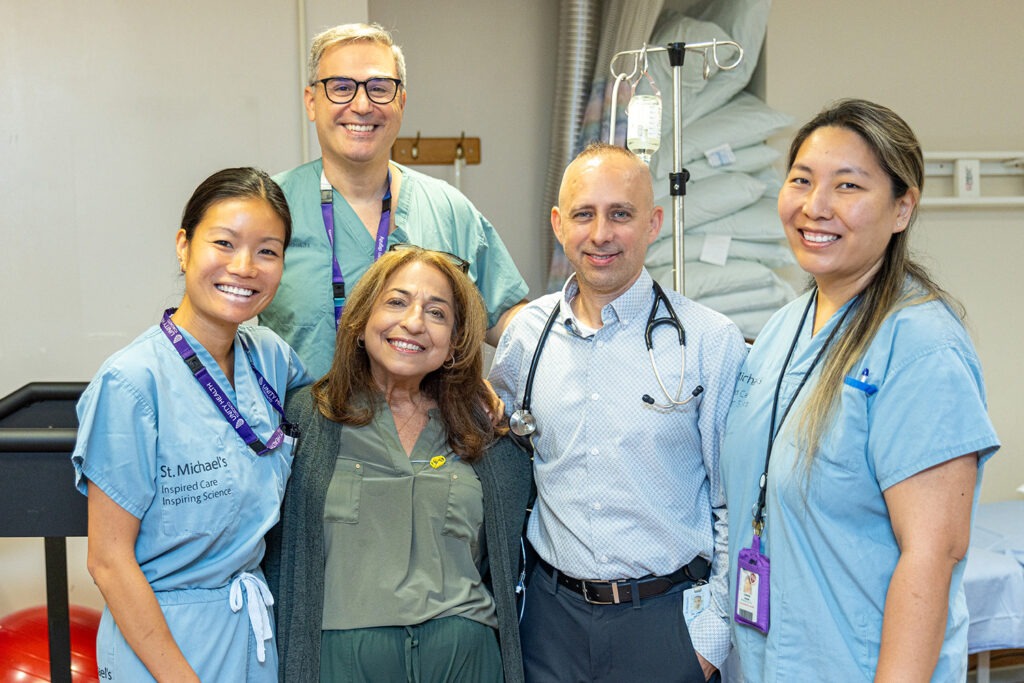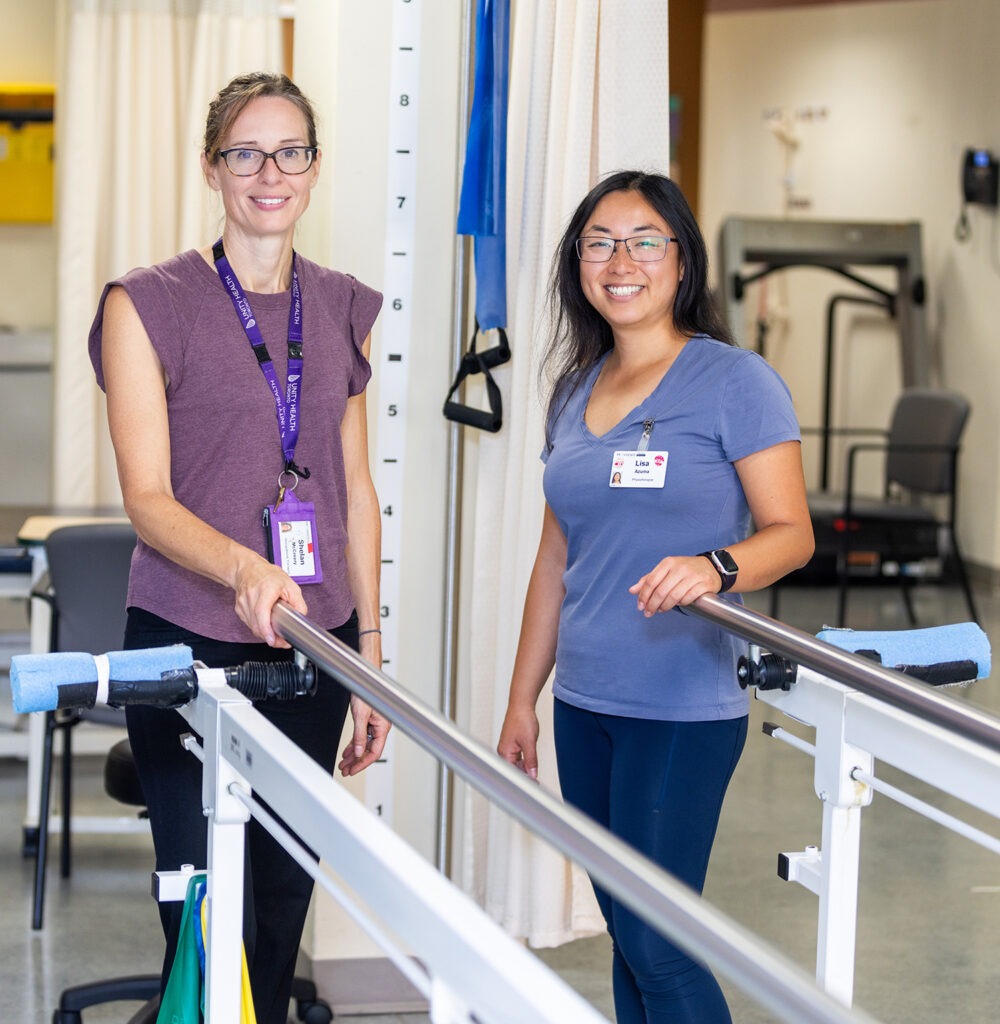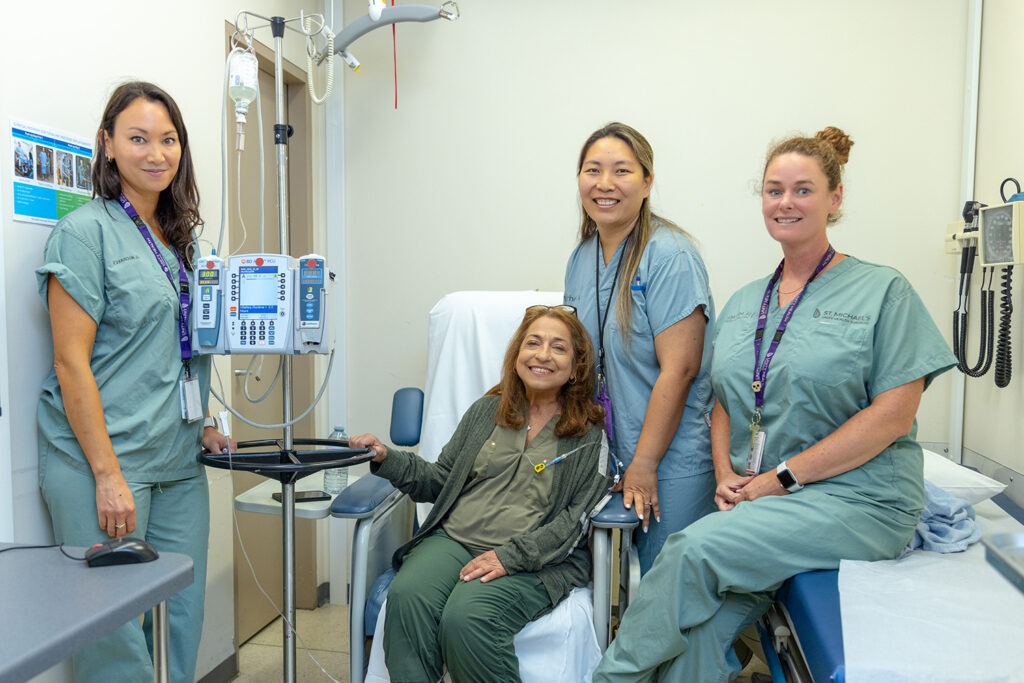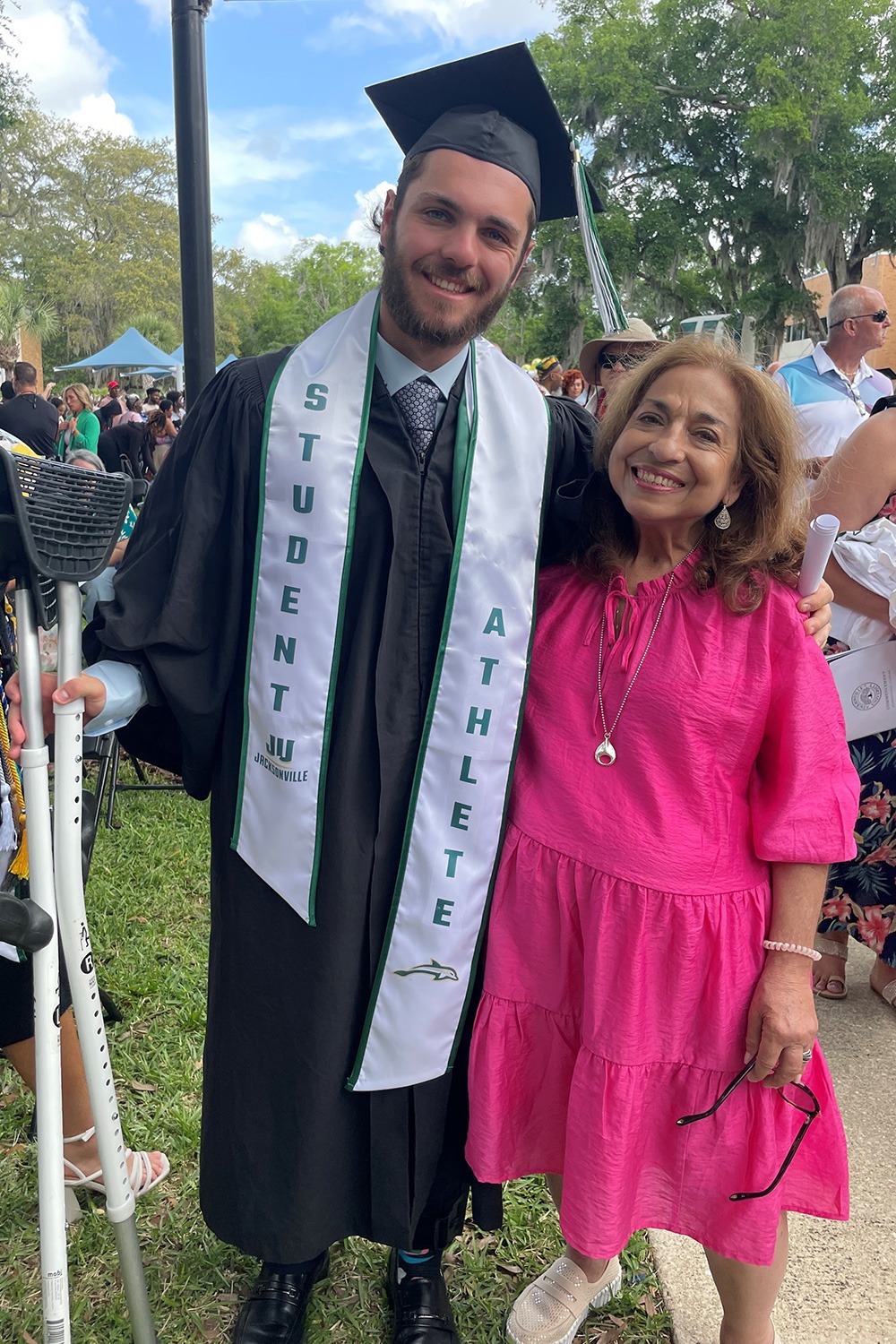For patients with this rare disease, St. Michael’s and Providence offer a pathway to independence

Audrey Gouskos (centre), with physiotherapist Gareth Sneath (right), credits rehab with helping her make it to her son's graduation after experiencing falls due to dermatomyositis.
Nearly 20 years ago, Audrey Gouskos came through the St. Michael’s Hospital Emergency Department unable to walk. She had trouble breathing and would be intubated for six weeks. At 41 years old, with a busy career and a three-year-old son at home, Gouskos recalls having her last rites read as clinicians worked to determine what was going on.
This was the beginning of her journey with a rare disease known as dermatomyositis.
“St. Michael’s has really kept me alive,” says Gouskos.
Sign up for the Unity Health Toronto newsletter, a monthly update on the latest news, stories, patient voices and research emailed directly to subscribers. If you haven’t subscribed yet, you can do that by clicking here.
Through the years, she has had flare ups that continue to require steroids to manage, been intubated twice, and now has a port for immunotherapy treatment. She has nine specialists at St. Michael’s and visits the hospital five to six times per month because her disease impacts so many different organs.
Myositis is an umbrella term for a rare autoimmune disease that makes your immune system attack your muscles. The skin, joints, lungs and heart can also be impacted. Affecting approximately one in 100,000 people, it causes muscle inflammation that leads to progressive weakness and functional limitations.

Unity Health Toronto is home to a first-of-its-kind rehabilitation pathway in Ontario where a team of clinicians in rheumatology and neurology at St. Michael’s and in rehabilitation at Providence Healthcare are working together to support patients with myositis to receive treatment and rehabilitation to manage their symptoms. There is no cure for myositis, but there are effective treatments to control the condition together with physical rehabilitation.
When St. Michael’s, a globally recognized fully affiliated academic health sciences centre, and Providence, a regional leader in rehabilitation, older adults and long-term care, became part of the Unity Health network, the Myositis Clinic team at St. Michael’s saw an opportunity to collaborate and leverage the rehabilitation expertise at Providence to care for myositis patients.
“The early stages of the expertise in myositis at St. Michael’s began with my colleague Dr. Rachel Shupak,” says Dr. Ophir Vinik, a rheumatology physician. “When I joined the hospital about 10 years ago and slowly developed expertise on this condition, what was striking to me was how these patients again and again fall between the cracks – they go for months or years sometimes with the wrong diagnosis, inadequate treatment, and they have nowhere to go because it’s rare and many clinicians don’t have experience with it.”
Vinik said that physiotherapy is a fundamental part of the recovery process for myositis patients, but many don’t get it because it’s a rare disease and these patients don’t fall perfectly into any [rehab] category.
“That’s what led to this Unity Health pathway,” Vinik says.

Over at Providence, clinical educators Shelan McCreery and Lisa Azuma support the rehab needs of myositis patients in both inpatient and outpatient settings. McCreery, an occupational therapist, and Azuma, a physiotherapist, say the rehab for this patient population is often exercise-based and can also address cognitive concerns depending on the needs of the patient.
“It’s an interdisciplinary team, so we’ll do a joint assessment to see where the patient is at and then tailor treatments based on each individual patient,” says Azuma.
Some patients may come in unable to lift their arms or with difficulty taking a step. Azuma says it’s rewarding to see how the rehabilitation can result in significant improvements in patients’ quality of life.
Azuma and McCreery say the new pathway has also highlighted how far patients travel to receive care for this rare disease.
“We’re here in Scarborough, but the Myositis Clinic gets patients from a wide area and from quite a distance sometimes, as well as in some cases younger patients who are working or have young families,” says McCreery. “So figuring out modifications or adaptations they need is something we really try to do, like offering the flexibility of virtual visits if that’s beneficial to them.”
The team has also collaborated with Arthritis Society Canada to share their expertise and to integrate myositis care into the Arthritis Society province-wide.
“So no matter where the patient is, the goal is they will have access to a clinician or allied health professional that at least has some experience or expertise that they can receive locally, and they don’t all have to travel to big centres, like in Toronto or London,” says Vinik.

Gouskos says she can’t stress enough the importance of physio and occupational therapy in helping her to continue to have independence in her life.
She recalls a few months back beginning to feel unsteady on her feet and having falls while at home. She began to worry about being able to get on a flight to make it to her son’s university graduation in Florida. Working with physiotherapists Gareth Sneath, and Angelo Papachristos at St. Michael’s, helped Gouskos to set goals.

“It might be getting on a flight, it might be how you can maneuver your body to get help if you fall, they help me know what to avoid having in my house to prevent falls, and give you exercises to take home. It’s been really instrumental in my progress.”
Gouskos was able to make it to Florida to see her son cross the stage and she continues to encourage him as he pursues an MBA and his passion for lacrosse. She also fills her time as a Patient and Family Partner with Unity Health and as a volunteer supporting a clinical trial at St. Michael’s.
“For me it’s been about not letting the disease take over and showing my son that with the right attitude you can’t always beat things, but you can cope,” she says. “I had a high profile career and I did want to go back to work, but I couldn’t, and so being involved with the hospital is my way of giving back.”
By Danielle Pereira. Photos by Yuri Markarov.
